Two opposing warriors transformed: Mitsuo Fuchida and Jake DeShazer
By Jack Voelkel
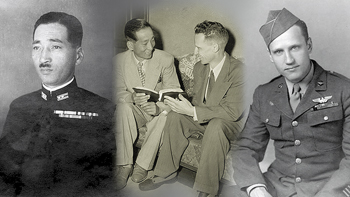
On December 7, 1941, 360 Japanese planes were launched from aircraft carriers in range of the Hawaiian Islands. Ace airman, Mitsuo Fuchida, gave the famous attack signal, Tora! Tora! Tora (Tiger! Tiger! Tiger!). They wreaked havoc on the unsuspecting U.S. Pacific Fleet anchored in exquisite Pearl Harbor. By the end of the attack, 8 battleships, 3 destroyers, and 3 cruisers had been sunk or severely damaged; 188 aircraft were destroyed;
2,403 people had been killed; and 1,178 were wounded (Benge, p. 26). As 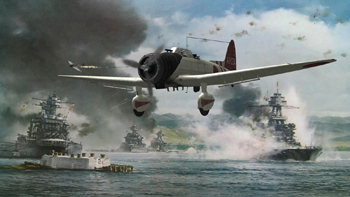 Fuchida guided the planes back to their carriers, he was filled with pride for his men and for himself. The surprise attack had succeeded beyond all expectations. His Admiral congratulated him, and later he had the extraordinary honor of personally giving his report to Emperor Hirohito.
Fuchida guided the planes back to their carriers, he was filled with pride for his men and for himself. The surprise attack had succeeded beyond all expectations. His Admiral congratulated him, and later he had the extraordinary honor of personally giving his report to Emperor Hirohito.
But Fuchida left behind more than smashed ships and aircraft and dead and wounded men. His raid left behind a nation “welded together by the fires he and his men had set – a United States that would not rest until the Japanese had paid in full for their morning’s work” (Prange, p. 37).
The Doolittle Raid
As a result of the raid on Pearl Harbor, the next day the United States and Britain declared war on Japan. President Franklin D. Roosevelt mandated to the Joint Chiefs of Staff to bomb Japan as soon as possible, to boost public morale. Lt.Col. James Doolittle, the daring and much decorated flyer ordered to plan and lead the mission, noted in his autobiography, “The Japanese had been told they were invulnerable. An attack on the Japanese homeland would cause confusion in the minds of the Japanese people and sow doubt about the reliability of their leaders” (Doolittle, pp 1,2).
Sixteen B-25 “Mitchell” bombers were carefully prepared to enable them to take off from an aircraft carrier. The 80 crewmen were volunteers, invited to participate in a dangerous mission the details of which they knew nothing until they were at sea heading for Japan. One of them was Corporal Jacob (Jake) DeShazer, a bombardier. His fear mingled with a sense of honor and privilege to participate in retaliation for the carnage of Pearl Harbor. His anger toward Japanese born on Pearl Harbor Day had grown into a deep hatred and obsession for revenge.
On April 18, 1942 the bombers began their flight. Fourteen hours later, Jake’s plane dropped its bombs on their target, and headed for free China. They never made it. He and his fellow crew members bailed out in the dark and landed in territory occupied by the Japanese army. Several airmen were executed; he and four other survivors were given life sentences.
A Prisoner of War
For 40 months, Jake and his companions were prisoners of war, often brutally beaten, tortured, poorly fed, and for most of the time kept in solitary confinement, their only companions lice, fleas, and rats. Sometimes they had to sit on tiny stools facing a wall for 16 hours a day. The only source of strength
Jake had to draw upon was his bitter hatred for the enemy. During the lonely hours Jake reviewed his life. His father had been a Church of God lay preacher. When he was a child his family had easily prayed and talked about spiritual things. But when Jake had left home, he had put all this behind him. He felt that now under these horrible conditions, since he had forsaken God, it would be dishonest to pray.
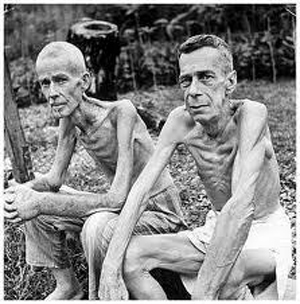
On one occasion when he and Bob, one of his fellow prisoners, were allowed to weed the courtyard, his companion said to Jake, “I do believe that Jesus Christ is the Lord and Coming King, and that He is God’s Son….The war is not going to stop until Jesus Christ causes it to stop” (Benge, p. 124). Bob later died, and Jake’s only thought was how anyone, even Jesus, could dare to suggest that a person love his enemies when they were mistreating and starving good men to death (p. 125). Uplift came when without fanfare the guards distributed several English language books among the prisoners. The prize volume was a Bible, but Jake had to wait 9 weeks for his turn to read it and he would only have it for 21 days.
“From the moment the Bible was brought to his cell, Jake barely slept or put the book down. Despite the fact that the light in his cell was dingy and the Bible text small, the words seemed to leap off the page at him” (Benge, p. 126). He read straight through, beginning with the Old Testament and continuing on with the New. As he read he became conscious of a Presence in the cell with him, “God right there beside him, reaching out to someone who was lost, alone, and abandoned” (p. 127). One day, as the Gospel truth come through the verses he was studying, he prayed “Lord, though I am far from home and though I am in prison, I ask for your forgiveness” (p. 127). His heart filled with joy. He knew he was a new man.
Changes
As he continued to read and study the Bible, the Lord spoke to him about forgiving others. One day a guard intentionally kicked his bare foot with his hobnailed boot several times, causing him intense pain. His first reaction was a desire for revenge. But pondering the verses he had memorized, including Jesus’ admonition for Christians to love and forgive their enemies, Jake recognized that Jesus was asking him to forgive his tormentor and to reach out to him with love.
As his attitude toward the guard changed, illustrated by forgiveness and grace, the man responded in kind, and Jake began to receive better treatment. Although he suffered repeatedly from dysentery and with boils all over his body, Jake became more and more conscious that God was with him. His desire to pray grew and he began to cry out to God to put it in the hearts of the Japanese leaders to sue for peace. Then one day he sensed the Lord say, “You can stop now. You don’t need to pray anymore. The victory is won” (Benge, p. 140).
“The victory is won!” A wonderful promise, but what he would do when the war was over? What would happen when the Emperor surrendered, leaving the Japanese without the assurance that they were invincible? Then, a startling thing happened. The room seemed electrified. Without warning he heard an audible voice speaking to him: “You are called to go and teach the Japanese people and go wherever I send you” (142).
Within days, God’s promised victory was corroborated. The guards brought him his own uniform and said, “The war is over now. You can go home.” The next weeks were a blur: he was flown back to the U.S., had a medical review, and returned home on a 9 week vacation. His family had heard that all the Doolittle Raiders had been killed, so the reunion was a very emotional one. Jake was a celebrity, constantly invited to speak and share his experiences. But deep within his heart burned the conviction that God had called him to return to Japan as a missionary.
Back To Japan
Jake resigned from the Air Force, studied for a degree in missions in a Bible College, and met Florence, a young woman who also had a call to missions. Their friendship ripened into love, they got married, and Jake was ordained by the Free Methodist Church and commissioned for missionary service in Japan.
At that time Jake wrote a short description of his experiences during the war entitled, “I Was a Prisoner of Japan.” The editors had it translated into Japanese and over 1 million copies were distributed in that country.
As their steamer passed under the Golden Gate Bridge, Jake couldn’t help but remember six and a half years before when on the deck of the USS Hornet he had been one of the Doolittle Raiders. Then he was an angry young bombardier off on a daring mission to make Japan pay for its raid on Pearl Harbor; and now? Jake made his way to their cabin and wrote: “This time I am not going as a bombardier, but I am going as a missionary. Now I have love and good intentions toward Japan. How much better it is to go out to conquer evil with the gospel of peace!” (Benge p. 168).
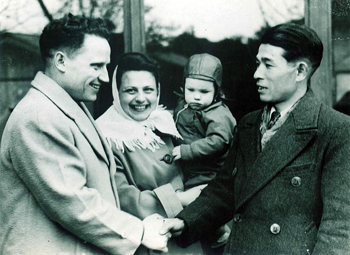
Before Jake and Florence could even leave the ship in Tokyo Bay, they were besieged by reporters who wanted to interview him. Because of the article he had written, he was famous and invited to speak in many places. Dr. Kaneo Oda, the superintendent of the Free Methodist Church in Japan, realized that Jake had a great opportunity to witness, and offered to be his interpreter. God began to use these meetings as hundreds gathered to hear his testimony. He preached four or five times a day for the next six years, and thousands of Japanese became Christians, including two of his former prison guards (Kelly p. 12). Meanwhile, Florence began Bible studies in their home.
Two Warriors Meet
A year and a half after arriving in Japan, Jake’s growing burden for the evangelization of the country led him to plan a 40 day fast, drinking only water. He poured out his heart in prayer for the country. One day at the end of the fast, a stranger came to visit him, none other than Mitsuo Fuchida, the airman who had led the raid on Pearl Harbor.
Fuchida shared his story. During the war, his life had been miraculously spared time after time, and once it was over, he hungered to find the source of true peace. Participating as a witness in war crimes trials, he decided to investigate how Japanese prisoners had suffered at the hands of their American captors. He was amazed to hear of Peggy Covell, an 18 year old volunteer, who had showed great love and service to the Japanese. When asked why she did this, she replied, “Because the Japanese killed my parents in the Philippines. They would have forgiven the soldiers, I know, and so I will do the same.” Fuchida was confronted with an illustration of God’s love.
Then one day he read Jake’s account of being a prisoner of war. The American’s decision to forgive the
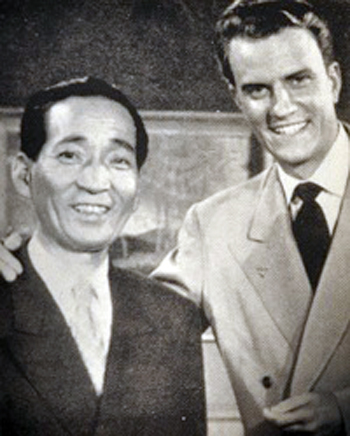
Japanese who mistreated him and give his life to serve them, deeply impacted him. As a result of these two experiences he purchased a New Testament and studied it thoroughly. Little by little the truth of the Gospel penetrated his life. “I seemed to meet Jesus…I requested Him to forgive my sins and change me from a bitter, disillusioned ex-pilot into a well-balanced Christian with purpose in living” (Fuchida, p. 3). Since then he had been speaking in public meetings calling on his countrymen to believe in Jesus.
It was natural for the two warriors – one who led the attack on Pearl Harbor and the other who participated in the first bombing raid on Japan – to kneel side by side and give thanks to the Lord for finding them, saving them, and giving them a call to share the Gospel. They began sharing the same platform and whenever possible held meetings all over Japan giving their testimonies of God’s grace.
Fruitful Ministry
Jake and Florence invested 29 years in Japan. During this time the DeShazers helped plant 23 congregations as well as participating in hundreds of meetings throughout the country. As the years passed, time and economic prosperity seemed to dull the Japanese interest in spiritual things. Jake’s popularity as one of the Doolittle Raiders waned. In later years, they encountered a growing antagonism to Americans. Nevertheless, Jake and Fuchida continued to preach with fervor and conviction.
As I review the story of these two old warriors, now soldiers of the same King, I am impressed at God’s parallel work in two lives:
Each deeply suffered, both physically and psychologically, and were confronted with the need to forgive their enemies.
- Each came to saving faith during a time of emotional turmoil, both by the testimony of others but more specifically through meditating on Scripture.
- Each was led almost immediately to declare and share their conversion with others, and were then called to engage in public ministry. For Fuchida, this was especially difficult as he was looked upon by the Japanese as a traitor to his culture and his religion. However, he believed that Jesus Christ was the only source of truth and must not be compromised (Prange, p. 261).
Even so, God uses our own testimonies, calling us to love others and demonstrate forgiveness and reconciliation. May the lives of these two men changed by Christ continue to encourage and challenge us and invite others to explore the Scriptures with us.
Bibliography
Benge, Janet & Geoff. Jacob DeShazer. Forgive your Enemies. Seattle: YWAM, 2009.
Doolittle, James H. and Carroll V. Glines. I Could Never Be So Lucky Again: An Autobiography. New York:Bantam Books, 1991.
Fuchida, Mitsuo. From Pearl Harbor to Calvary. http://www.biblebelievers.com/fuchida1.html.Kelly, Clint. Flight into Eternity. World War II POW Jake DeShazer Chose a Life of Love not Hate. Response. Seattle Pacific University, Spring, 2004.
Prange, Gordon W. With Donald M. Goldstein and Katherine V. Dillon. God’s Samurai. Lead Pilot at Pearl Harbor. Washington, DC: Brassey’s, Inc: 2004.
This article was originally published on the website of urbana.org, a department of InterVarsity Christian Fellowship. Used by permission of the author.




hmmm. I was going to do this story. Somebody read my mind and did it first. no fair!
LOL!
Comments are closed.